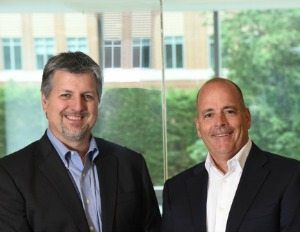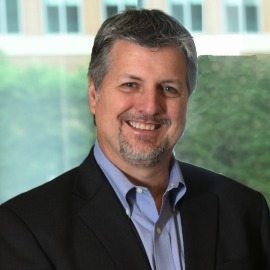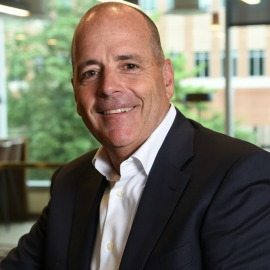
What do you get when you cross a corporate lawyer with a chief financial officer?
In Greg Laubach’s and Chris Hearing’s case, the answer is an exceptionally experienced business dynamo tempered with a cascade of disarming humor.
The two have known each other for almost 30 years as Hearing’s career in finance intersected with Laubach’s background as an attorney and business executive. Both exited their previous roles in late 2016, and believing there was a niche in the marketplace for their services, they teamed up early this year to form Navigare Advisory Partners. Navigare’s “special sauce” is its leaders’ personal experiences owning, operating, and advising multiple different businesses, the two said.
“In a nutshell, what we do is provide business and financial strategic advisory services to middle market companies,” Hearing said.
That includes operational and organizational improvement and helping clients with acquiring business or selling their own.
“A client described our organization best, ‘You are C-suite advisers to the C-suite,’” Laubach said. “They see us as folks who have been in the trenches of all aspects of business operations and know how to get things done.”
The Partners’ Path to Navigare
Laubach practiced law at international law firm Venable LLP for several years, served as a general counsel at a wholly owned subsidiary of Marriott and went on to be involved with a series of entrepreneurial efforts, including Planet Depos, a leading global court reporting firm headquartered in Washington, D.C.
With an MBA in hand, Hearing went to work for a division of Time, Inc., and eventually climbed the ladder to become chief financial officer of Time Life, where he oversaw the finance and operations of a $700 million business. For the past 15 years, he’s been an executive leader in privately held firms focused on direct marketing, live entertainment, product development and branding. Like Laubach, Hearing has advised many nonprofits serving on association and university boards.

The Vision that Drives Them
When Hearing was president of his last company, Direct Holdings Global, it was generating $100 million in annual revenues, mostly by selling CDs and DVDs, he said.
“As you can imagine, that was a very threatened marketplace as everything was moving online and into streaming and digital delivery, so we were faced with a challenge of what to do with this business long term,” Hearing said.
One option was to operate conservatively until the business reached the end of its life in five to seven years and wind down operations. That certainly would have been lucrative, but it would also have left 60 employees looking for other jobs, Hearing said, and more importantly, “would not have leveraged their market knowledge and intellectual capital.”
“The other option was to try to figure out a way to grow that business and find new revenue streams,” Hearing said.
So began a months-long process to dig deeper into the company’s strengths, behaviors and competencies. Based on their findings, company leaders in 2008 launched a live entertainment side to the business. Over the next five years that division grew four times its original size and contributed $50 million of revenue and was “driving all the profitability,” Hearing said.
Laubach enjoyed similar success in re-orienting company strategy. Several years ago, he was an executive with a global firm that acquired a public company to add to its portfolio of operating businesses. Post-acquisition, the acquired business “struggled to meet pro-forma expectations,” he said.
“After much debate and hand-wringing as to what was wrong, a handful of us got together, ‘climbed to 30,000 feet’ and examined both the operating model of the parent and the subsidiary for clues,” Laubach said. “At some point during those conversations, the realization hit us — while the businesses operated in the same space, the operating model of the acquired business was completely different from the parent. At that moment, it became clear we needed to run more like the parent, and a solution was found. This lead to the creation of an industry-first franchise program, one that transformed the business almost overnight.”
Sometimes, Laubach said, there’s a need for an “outside looking in” approach that affords business leaders an opportunity to see things from a different perspective — and, he said, that’s precisely what Navigare does.

The Future of Navigare
Laubach and Hearing said there is an unmet demand for strategic advisers with their experience.
“We enjoy what we do,” Laubach added. “We are in growth mode, we are looking to bring new advisers who fit with our culture and guiding principles, to service our geographically diverse client base.”
The two said they place a high value on integrity, quality of work, and enjoying what they do.
“Everyone works really hard to achieve a high-performance level, and we think it’s important that you also enjoy the journey along the way and celebrate the successes,” Hearing said. “We like to have some fun not only at Navigare but also with our clients.”
About Greg and Chris
Laubach earned his undergraduate and law degrees from the University of Pittsburgh. Outside the office, he’s been active in a number of community and charitable organizations, including Best Buddies, Literacy Council of Montgomery County and the Make-A-Wish Foundation. He lives in Bethesda, Maryland, with his wife and three children, and enjoys golfing and outdoors activities.
Hearing holds a bachelor’s degree from Villanova University and an MBA from the University of Maryland. He enjoys music, golf and woodworking. He lives in Rockville with his wife, Judy.
His favorite quote — and maybe an informal Navigare tagline — comes from legendary basketball coach John Wooden: “When opportunity comes, it’s too late to prepare.”

